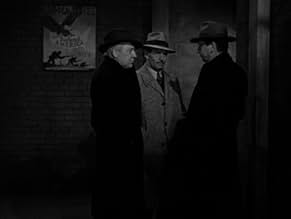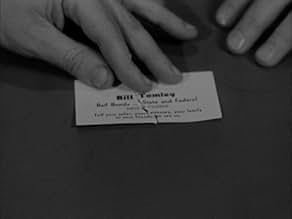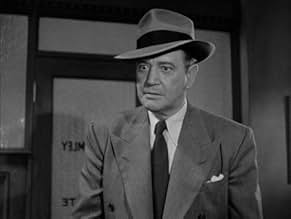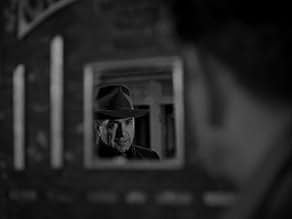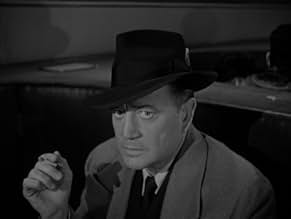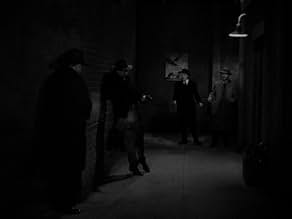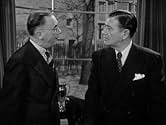IMDb RATING
6.3/10
1.3K
YOUR RATING
A depressed man hires an assassin to kill him when he least expects it, but when his life takes an upward turn, he finds he now wishes to live.A depressed man hires an assassin to kill him when he least expects it, but when his life takes an upward turn, he finds he now wishes to live.A depressed man hires an assassin to kill him when he least expects it, but when his life takes an upward turn, he finds he now wishes to live.
- Director
- Writers
- Stars
Trevor Bardette
- The Bum in the Next Bed
- (uncredited)
William 'Billy' Benedict
- The Deafmute
- (uncredited)
Willie Bloom
- Bum
- (uncredited)
Roy Brent
- Detective in Alley
- (uncredited)
Charles Coleman
- Jennings the Butler
- (uncredited)
Clancy Cooper
- Telephone Repairman
- (uncredited)
Don Costello
- Lefty Vigran aka Gorss
- (uncredited)
Russell Custer
- Bar Patron
- (uncredited)
Ralph Dunn
- Cop at Car Accident
- (uncredited)
Otto Forrest
- The Whistler
- (uncredited)
Byron Foulger
- Flophouse Desk Clerk
- (uncredited)
John George
- Bum
- (uncredited)
Dick Gordon
- Tomley's Assistant
- (uncredited)
Robert Homans
- Dock Watchman
- (uncredited)
- Director
- Writers
- All cast & crew
- Production, box office & more at IMDbPro
Featured reviews
This unusual Film Noir (the only one ever to be made into a whole series of films) certainly catches the sinister atmosphere of its genre, both visually with very well done shadow effects and the adequate 'cheap' harbor surroundings of a B movie, and thematically, using a lot of psychology which doesn't fail to have its effects, neither on the protagonists nor on the audience - but just a little bit of an overdose of the belief in 'destiny'...
Whose destiny is it to live or to die? Who has a 'right' to live or to die? Questions like these are maybe somehow out of place in a Film Noir - because they've got too much to do with morality. The Noir world (at least that of the 40s) is usually quite immoral (see "The Maltese Falcon", "The Shanghai Gesture", "Gilda"); and it's not always the good ones who get away - that's the cynical Noir philosophy...
But anyway, "The Whistler" still remains an enormously suspenseful film with a very capable cast and direction; and a 'must' for every fan of classic crime.
Whose destiny is it to live or to die? Who has a 'right' to live or to die? Questions like these are maybe somehow out of place in a Film Noir - because they've got too much to do with morality. The Noir world (at least that of the 40s) is usually quite immoral (see "The Maltese Falcon", "The Shanghai Gesture", "Gilda"); and it's not always the good ones who get away - that's the cynical Noir philosophy...
But anyway, "The Whistler" still remains an enormously suspenseful film with a very capable cast and direction; and a 'must' for every fan of classic crime.
Before he became a producer and conjured up all those publicity gimmicks for his cheesy horror pictures, William Castle churned out a series of nifty little pictures as a director for Harry Cohn's B unit -- including the immortal "When Strangers Marry". "The Whistler" is a clever noir that tackles the old premise of a despondent man hiring a contract killer to murder him, only to change his mind later. Castle provides a higher standard of mise-en-scene than in most pictures of this ilk, with nice camera movement and grungy, realistic sets. The absurd plot twists and lapses of logic stretch credulity to the utmost -- but that's one of the "beatitudes of the B's" (as Andrew Sarris would say). It's surprising that Cornell Woolrich was not the original author, so close is the atmosphere to his oeuvre. Dix is a bit of a cipher, but Naish is as compelling as always in another offbeat role as the philosophical hit man who suffers from fear of death; plus there are plenty of familiar faces in minor roles. The mysterious omniscient Whistler narrator is effective, if somewhat underused here. Castle went on to direct two even better entries in the series.
A man (Richard Dix) is despondent after the death of his wife but can't bring himself to commit suicide.. So he hires a professional hit-man (J. Carrol Naish) to do the deed for him. But suddenly things are looking up for him and he wants to live. The problem is he has a killer after him that he already paid for! An outlandish premise but a fun start to Columbia's Whistler series. The Whistler was a popular radio program of the time. I am way too young to remember the radio show when it first aired, but I have heard many episodes on satellite radio. It's a good show. The movie series is good, as well, with iron-jawed Richard Dix playing the lead in all but one of them. He plays a different role in each movie, just like Lon Chaney, Jr. was doing over at Universal in their Inner Sanctum series.
Like I said, this is a fun movie despite the unbelievable premise. Nice supporting cast backing up Dix including Gloria Stuart, Alan Dinehart, William Benedict, and J. Carrol Naish. Benedict first appears on screen reading a Superman comic book. This has to be one of the earliest appearances or mentions of Superman in a live-action movie. It's also one of the earliest directing jobs from William Castle.
Like I said, this is a fun movie despite the unbelievable premise. Nice supporting cast backing up Dix including Gloria Stuart, Alan Dinehart, William Benedict, and J. Carrol Naish. Benedict first appears on screen reading a Superman comic book. This has to be one of the earliest appearances or mentions of Superman in a live-action movie. It's also one of the earliest directing jobs from William Castle.
Solid, low-budget film noirish yarn about a man who takes out a contract on himself and then through a reversal of fortune decides against it. The Whisteler open up the film with that delightfully creepy little tune and a brief narrative and the reigns are handed over to a competent corp of character actors(and Richard Dix and Gloria Stuart). Dix plays the lead well-enough though incredibly lethargically. He literally looks like he hasn't slept in days. Stuart is peppy and pretty in a smallish role, but J. Carrol Naish does an outstanding job as the contracted killer. He gives a layered performance is what was a truly difficult role. The film barely spans an hour and ten minutes or so but never lags. we get suspense, action, and answers rather quickly. The Whistler has a much more subdued role then what you would hear in the radio series. This film would go on to spawn many sequels and was one of the earliest directorial forays of horror icon William Castle. Castle, as always, does a more than workmanlike job.
This first Whistler film, unlike the others, has recognizable supporting players in the cast besides Richard Dix at the center of the story who plays a different character with different problems in every film. This supporting cast includes J. Carrol Naish as the hired killer, Gloria Stuart as Alice Walker, the main character's secretary, and Alan Dinehart as the shady friend of the hired killer.
In this first installment Richard Dix plays industrialist Earl C. Conrad. It is explained that Conrad's marriage was in trouble so the couple went on a cruise. But Conrad's wife was lost at sea, and all of his friends ostracized him when he came back alone, thinking that he might have killed her to get rid of her. Three years of this and Conrad decides to kill himself but doesn't have the nerve to do it himself. So he hires a hitman to do it for him. He has contact with the middleman who arranges the hit, but will have no idea where or when or by whom his death will take place.
But then a telegraph comes telling Conrad that his wife has been found in a Japanese internment camp, and that the International Red Cross will be transporting her home. Now Conrad will not only have his wife back but will be exonerated among his friends. Thus he thinks life will be worth living again. But in the interim, the middleman who arranged the hit has been killed in a shootout with the police, so he has no way to call the thing off.
And most unfortunately , for the hitman this is not just business. He likes to read criminology books and wants to see if he can scare Conrad to death by making himself seen so Conrad knows he's being stalked.
Most of The Whistler movies have lots of twists and irony in them. This is just one long manhunt/chase scene after the first fifteen minutes with nothing special about it. Although Naish as the hitman is effectively creepy. Also different about this first Whistler film - The Whistler's whistling actually enters into the plot.
In this first installment Richard Dix plays industrialist Earl C. Conrad. It is explained that Conrad's marriage was in trouble so the couple went on a cruise. But Conrad's wife was lost at sea, and all of his friends ostracized him when he came back alone, thinking that he might have killed her to get rid of her. Three years of this and Conrad decides to kill himself but doesn't have the nerve to do it himself. So he hires a hitman to do it for him. He has contact with the middleman who arranges the hit, but will have no idea where or when or by whom his death will take place.
But then a telegraph comes telling Conrad that his wife has been found in a Japanese internment camp, and that the International Red Cross will be transporting her home. Now Conrad will not only have his wife back but will be exonerated among his friends. Thus he thinks life will be worth living again. But in the interim, the middleman who arranged the hit has been killed in a shootout with the police, so he has no way to call the thing off.
And most unfortunately , for the hitman this is not just business. He likes to read criminology books and wants to see if he can scare Conrad to death by making himself seen so Conrad knows he's being stalked.
Most of The Whistler movies have lots of twists and irony in them. This is just one long manhunt/chase scene after the first fifteen minutes with nothing special about it. Although Naish as the hitman is effectively creepy. Also different about this first Whistler film - The Whistler's whistling actually enters into the plot.
Did you know
- TriviaFirst of eight entries in the "Whistler" series, released from 1944 to 1948, and Richard Dix appeared in all but the last one. Unusually, he played a different character in each.
- GoofsWhile the killer is lying on the bed perusing his book on Fear of Death, a cigarette suddenly appears in his mouth.
- Quotes
The Bum in the Next Bed: Rats in this place as big as beavers. They won't hurt ya... but you're liable to trip over them in the dark.
- ConnectionsFeatured in Spine Tingler! The William Castle Story (2007)
Details
- Runtime
- 59m
- Color
- Aspect ratio
- 1.37 : 1
Contribute to this page
Suggest an edit or add missing content

